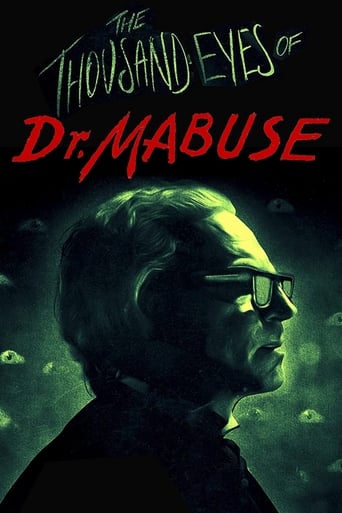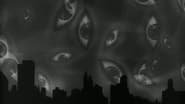Coventry
For nearly three decades, the visionary and brilliantly gifted writer/director Fritz Lang lived in the United States, because he fled from the Nazis and particularly from Joseph Goebbels who banned all of his previous films. But during the late fifties he returned to his home country Germany and completed the final three films of his rich career. Of course he couldn't retire without dedicating one last film to the character that is probably his most personally dearest and convoluted creation: Dr. Mabuse! The ingeniously and aptly titled "The 1000 Eyes of Dr. Mabuse" is in fact a belated but direct sequel to Lang's 1933 masterpiece "The Testament of Dr. Mabuse". It's a convoluted but extremely intelligent and hugely compelling mystery/crime thriller, with many characters and even more plot twists and secret story lines to discover. Some of the plot aspects are obvious and predictable, but most of the film is very surprising and incredibly fascinating! TV journalist Peter Barker dies in his car in the middle of an intersection, but what initially seems to be death by heart-attack turns out to be a case of vile murder committed by an ultra-advanced weapon that fires needles of steel into the victims' brains. Police Commissioner Kras was informed about the murder from beforehand, by the mysterious blind clairvoyant Peter Cornelius, and the modus operandi of the murder is very reminiscent to a murder committed nearly 30 years ago, by the henchmen of criminal mastermind Dr. Mabuse. The investigation of this crime, as well as several other peculiar and unsolved murders, leads to the Luxor Hotel. While commissioner Kras meets up with some interesting people at the bar, like an insurance agent and a hotel detective, we are introduced to two other guests, namely the beautiful young lady Marion who's about to commit suicide by jumping off the hotel's balcony, and the gentle and wealthy American industrialist Henry Travers who's courageous enough to save her. What connects all these individual people to the murder of journalist Peter Barker? And what's the link with Dr. Mabuse, who allegedly died in a mental asylum 30 years earlier? "The 1.000 Eyes of Dr. Mabuse" almost entirely revolves on suspenseful plotting and the intriguing rebirth of Lang's titular anti-hero protagonist. This film doesn't feature those beautiful expressionist trademarks anymore, like the case in the 1922 and 1933 films. That's okay, though, since the film was released in an entirely different era and focuses on more contemporary relevant things, like espionage and violent gimmicks such as exploding telephones and new kinds of artillery. However, one thing that Fritz Lang definitely kept alive in his post-WWII Dr. Mabuse movie is the criticism towards Germany's fascist past, ha! Apart from a terrific screenplay and a wondrously grim atmosphere, "The 1.000 Eyes of Dr. Mabuse" can also rely on a whole series of impeccable acting performances. Gert Fröbe, known as one of the best James Bond villains in "Goldfinger", is excellent as the skeptical police inspector in charge of the investigation. Other great performances come from Peter Van Eyck, Dawn Addams, Wolfgang Preiss and Werner Peters. Cult fanatics will also definitely recognize Jess Franco regular Howard "Dr. Orloff" Vernon in a delightful supportive role as merciless hit man. The reincarnation of Dr. Mabuse's character also meant the start of several more sixties' sequels, and I plan to watch them all … one day. Great stuff, warmly recommended to fans of Fritz Lang, but also to admirers of good "Krimi" (crime) thrillers.
Robert J. Maxwell
Fritz Lang is a talented director. He's the guy who made "Metropolis," a startling vision of the future before such visions were cool. And he made "M", which turned a monster into an object of pity. In America, after slipping out of Germany, he directed a couple of fascinating noirs.But you wouldn't know it from "Die 1000 Augen des Dr. Mabuse." Even the always-interesting presence of Peter Van Eyck, Hollywood's Ur-German, and the almost unrecognizable Wolfgang Preiss, can't save this from being a fairly typical B-movie with a plot more confusing than most.After an opening that might have come directly from a Charlie Chan movie -- a victim collapses in public, shot in the head with an almost undetectable sliver of metal -- we are taken to a garishly made-up Dawn Addams perched on the ledge of a tall building, about to jump for reasons we know not of.She's talked in by Van Eyck and there follow innumerable perplexing plot developments organized around a couple of themes that don't seem to have much to do with one another.Lang often made good use of mirrors and he does so here. And Gert Frobe turns in a good performance as a shambling, good-natured, pipe-smoking detective.The story, though, is full of incidents that may be suspenseful in themselves without helping the plot in an immediate way. It plods along like somebody with a club foot.It's a disappointing piece of work, slow and uninteresting. Fans of Fritz may get more out of it than I did.
Eumenides_0
Fritz Lang's final movie saw him return to one of his greatest creations, the enigmatic criminal master Dr. Mabuse. Much like the influence this villain has over people in the movies, so was the influence he had over Lang, who made three distinct Dr. Mabuse movies in three different periods of his life.In The 1000 Eyes of Dr. Mabuse we go to post-war Germany. Mysterious, ingenious crimes are succeeding one after another, so brilliant in technique that the police remember the crimes of Dr. Mabuse, just before Hitler took over.Meanwhile a rich American industrialist is in Germany to close a deal. At the Luxor Hotel he saves a woman from committing suicide. But this altruistic gesture plunges him into a world of deception, blackmail, voyeurism and international crime.Trying to get to the bottom of this is Commissioner Kras, with the help of a shifty insurance salesman and a blind psychic.Lang's movies have always been ahead of their time. His silent movies showed an amazing understanding of the language of cinema, and when sound came he incorporated it into the movie as a storytelling tool and not just an excuse for talking heads. In this movie we see the genesis of modern thrillers like the Bond franchise: secret criminal empires, shadowy villains, cars with intricate gadgets, the use of secret cameras to spy on people, unique weapons. But even after fifty years, here it still looks fresh and bold.Much like The Testament of Dr. Mabuse, this is one of the best thrillers I've ever seen. It's suspenseful, it's surprising, and it's intelligent. Kras is not the moronic policeman we see so often in cinema; he's clever, he's good at deducing things. And Dr. Mabuse is always one step ahead, always has contingency plans, knows everything. How distant he is from the barely-articulate villains of our times.Any film lover will do himself a favor by watching this neglected gem.
Jim-328
This is a 16mm print which I acquired in a batch of films. It is very well dubbed in English. I assume the film is available on video. This film reminds me of the serials of the 1930's. Fritz Lang ended his career with this swansong, a return to a theme of his earlier Dr. Mabuse films. The master criminal's henchmen have never seen his face, and get their commands by radio while cruising in a van. Note the scene in the police commissioner's office. Everyone is smoking furiously and the room soon becomes filled with smoke. There is an almost identical scene to this in "M". Overall and very amusing and enjoyable film.





